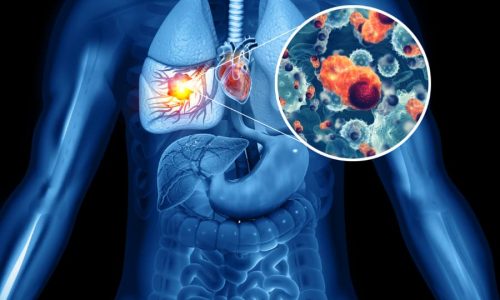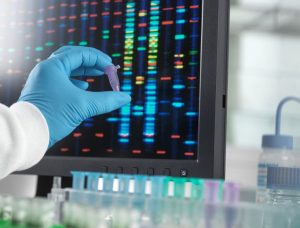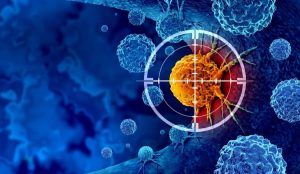
Recognizing Cancer Misinformation: Expert Insights from 2 RCCA Oncologists
“Consider the source.” It’s good advice for dealing with the sting of criticism or the allure of gossip, but two oncologists say it’s even better
HIPAA Alert: Potential Data Breach Learn More
Questions on Oncology, Hematology and/or Infusion Clinical Services due to COVID-19 Crisis – CALL 833-698-1623
Important Information for Our Patients Regarding the Coronavirus.
RCCA Providing Area Cancer Patients with Access to Care During Coronavirus Outbreak
RCCA Offering Patients Virtual Visits During Coronavirus Pandemic
Research has identified many clues to how cancer develops. This new understanding of the processes that cause normal cells to become cancerous and then spread is helping clinicians manage cancers that were once untreatable or poorly responsive to treatment, offering new hope to many patients and their families.
Among these discoveries are the roles played by proteins on the surface of cells and mutations (changes) in a patient’s genes that can give rise to different types of lung cancer. Researchers have used this knowledge to develop treatments that target specific abnormalities, allowing clinicians to plan precise, personalized treatment.

The expert medical oncologists and hematologists of Regional Cancer Care Associates (RCCA), one of the nation’s largest networks of oncology specialists, explain how genetic changes can drive development of certain lung cancers, and how treatment can be tailored to the genetic profile of many lung cancers.
Cancer is a disease marked by abnormal cell growth in the affected areas or tissues of the body. Abnormal cells contain mutated genes that fuel the cancer’s growth and spread.
Mutational testing, also called biomarker testing or molecular testing, often is recommended to look for a genetic alteration in a tumor and to help the medical team determine if an approved medication that targets that specific mutation and cancer type is available.
The testing is conducted on cells obtained when a tumor is removed during surgery or when a biopsy is performed to remove and analyze tissue – such as from the prostate or breast – after imaging studies or other assessments suggest or find that cancer is present. In other cases, a newer approach called “liquid biopsy” is used to analyze a blood sample. The cells are inspected to see if they have mutated genes, surface proteins that facilitate the development of cancer, or other abnormalities. These findings can help determine if a patient is eligible for a targeted therapy.
Targeted therapy is a cutting-edge approach to treating cancer that entails use of drugs to attack cancer cells or disrupt their function and reproduction. These medications specifically target malignant cells – typically by binding to receptors on their surface – while leaving healthy cells intact. This mode of action differs from that of chemotherapy, which affects both healthy and cancerous cells.
Targeted therapy often is used in conjunction with conventional treatments such as surgery, radiation, and chemotherapy. Targeted therapy may be recommended if cancer has spread too extensively to be removed surgically or if cancer has returned after other treatments.
Targeted therapy medications can include many kinds of drugs but are mostly classified into two main types: small-molecule and large-molecule drugs:
Depending on the type of cancer, one type of drug may be more effective than the other.
Targeted therapy drugs have different functions based on their type and subtype. Some of the main functions include:
Lung cancer is a very common type of cancer, accounting for more deaths than any other cancer. It is most common in people aged 65 and older and in persons who smoke or have smoked tobacco products. However, people of all ages and even nonsmokers can develop lung cancer.
The two main types of lung cancer are non-small cell lung cancer (NSCLC) and small cell lung cancer (SCLC). NSCLC is much more common and tends to grow gradually, while SCLC is less common but more aggressive and fast-growing.
Lung cancers often go undetected in their early, more-treatable stages because they typically do not cause symptoms at that point. When symptoms do develop – often after the cancer has advanced – they sometimes are mistaken for smoking-related symptoms or consequences of a more innocuous health problem, such as a persistent cold or flu, further delaying diagnosis. These symptoms include a chronic cough, trouble breathing or shortness of breath, or chest pain. This is why individuals at increased risk of lung cancer should be screened annually, so that the disease can be detected and treated early.
The stage and type of lung cancer will determine which treatment options are most likely to be effective for a particular patient. Treatment plans often combine conventional modalities such as surgery and chemotherapy with innovative treatments such as immunotherapy or targeted therapy.
When lung cancer develops, the abnormal cancer cells contain genes that are altered, or “mutated.” Three common mutations associated with NSCLC are:
EGFR is a protein on the surface of cells that helps them grow and divide. In lung cancer patients who have an EGFR mutation, the protein does not have an “off switch,” resulting in abnormal cell growth and, ultimately, cancer.
EGFR is identified in around 10 to 15 percent of patients with lung cancer, and is more common in people who have never or rarely smoked, the American Lung Association (ALA) reports. Drugs called EGFR inhibitors can block the signal from EGFR that tells the cells to grow, leading to disrupted cancer growth.
The anaplastic lymphoma kinase (ALK) supports embryonic development. The ALK gene then “turns off” before birth. For patients with an ALK fusion mutation, however, the gene “awakens” again and fuses with other genes, leading to cancer.
ALK-positive lung cancer is found in roughly 4 percent of NSCLC patients, typically in those with adenocarcinomas, the ALA says. ALK-positive patients with lung cancer are usually younger than the average age for lung cancer diagnosis and do not have a smoking history, the ALA reports. Two types of oral medication, tyrosine kinase inhibitors (TKI) or ALK inhibitors, can be used to stop the fusion and abnormal growth.
The KRAS gene controls production of a protein that contributes to cell growth. A mutated KRAS gene leads to cell overgrowth, which can cause cancer. About a quarter of patients with lung cancer have a KRAS mutation, which is found mostly in current and former smokers as well as in people of Western European descent.
Patients with lung cancer with a KRAS mutation typically receive conventional cancer treatments such as surgery, radiation, or chemotherapy. If these treatments are unsuccessful, a KRAS inhibitor (for patients with KRAS G12C) may be recommended.
While these are some of the most common mutation targets in patients with lung cancer, there also are others, such as the BRAF V600E mutation, MET exon 14 skipping mutation, and RET fusion mutation. An estimated 15 percent of patients with lung cancer have some type of gene mutation associated with their disease, and some of these abnormalities may respond to targeted therapy treatment.
Because each precision medication is formulated to attack a specific genetic target, only patients with certain genetic mutations are eligible to receive this type of agent. This is why mutational testing is necessary to determine if a targeted therapy can work for that patient – or if a different mode of treatment is needed.
Of note, targeted therapies currently only work on patients with NSCLC, not with SCLC.
Is a tissue biopsy or liquid biopsy better for mutational testing?
Both types of biopsies offer advantages. A tissue biopsy usually is more sensitive than a liquid biopsy, but also is more invasive.
Overall, liquid biopsies are suitable for finding less complex point mutations, such as EGFR mutations, while tissue biopsies are effective for more complex mutations, such as gene fusions.
How long does it take to get results from mutational testing?
The turn-around time for results depends on the type of biopsy and the laboratory used. Liquid biopsy results usually come within 5 to 7 days. Tissue biopsy results typically take longer—about 2 to 4 weeks.
Should every patient with lung cancer get mutational testing?
As researchers learn more about the relationship between genetics and cancer development, mutational testing is becoming increasingly useful for providing insight into cancer treatment. Patients should talk with their physicians about whether mutational testing makes sense in their case.
Does targeted therapy have side effects?
Targeted therapy generally has fewer side effects than conventional treatments, because the medication targets the cancer cells directly. Some patients, however may experience side effects such as high blood pressure, flu-like symptoms, liver problems, or diarrhea. Many symptoms typically resolve on their own or with treatment, but patients should contact their oncologist/hematologist if an adverse effect persists or becomes intolerable.
How are targeted therapy drugs administered?
Many targeted therapies come in pill form and are taken on a daily or weekly basis, while others are infused intravenously (injected directly into a vein) at regular intervals. Many patients with NSCLC take targeted drugs in tablet form at the same time each day.
How would a patient know if targeted therapy is effective?
Patients undergoing targeted therapy receive regular follow-up testing with their medical providers to see how the cancer is responding to the treatment. These tests may include physical exams, blood tests, and imaging scans.
The expert oncologists and hematologists of RCCA provide a comprehensive, compassionate approach to treatment of lung and other cancers by:
RCCA has 22 community-based, conveniently located treatment centers throughout New Jersey, Connecticut, Massachusetts, and the Washington, D.C., area. To learn more about RCCA, visit our frequently asked questions section on this website, or contact us to request an appointment today.
For more information or to schedule an appointment,
call 844-346-7222. You can also schedule an appointment by calling the RCCA location nearest you.

“Consider the source.” It’s good advice for dealing with the sting of criticism or the allure of gossip, but two oncologists say it’s even better

Biomarker testing is the evaluation of samples of a patient’s tumor, blood, or both to identify the genetic mutations responsible for the development of cancer,

Medical research has made tremendous strides in improving how oncologists understand and treat cancer. One of the most exciting developments is the use of radiopharmaceuticals.

Regional Cancer Care Associates is one of fewer than 200 medical practices in the country selected to participate in the Oncology Care Model (OCM); a recent Medicare initiative aimed at improving care coordination and access to and quality of care for Medicare beneficiaries undergoing chemotherapy treatment.